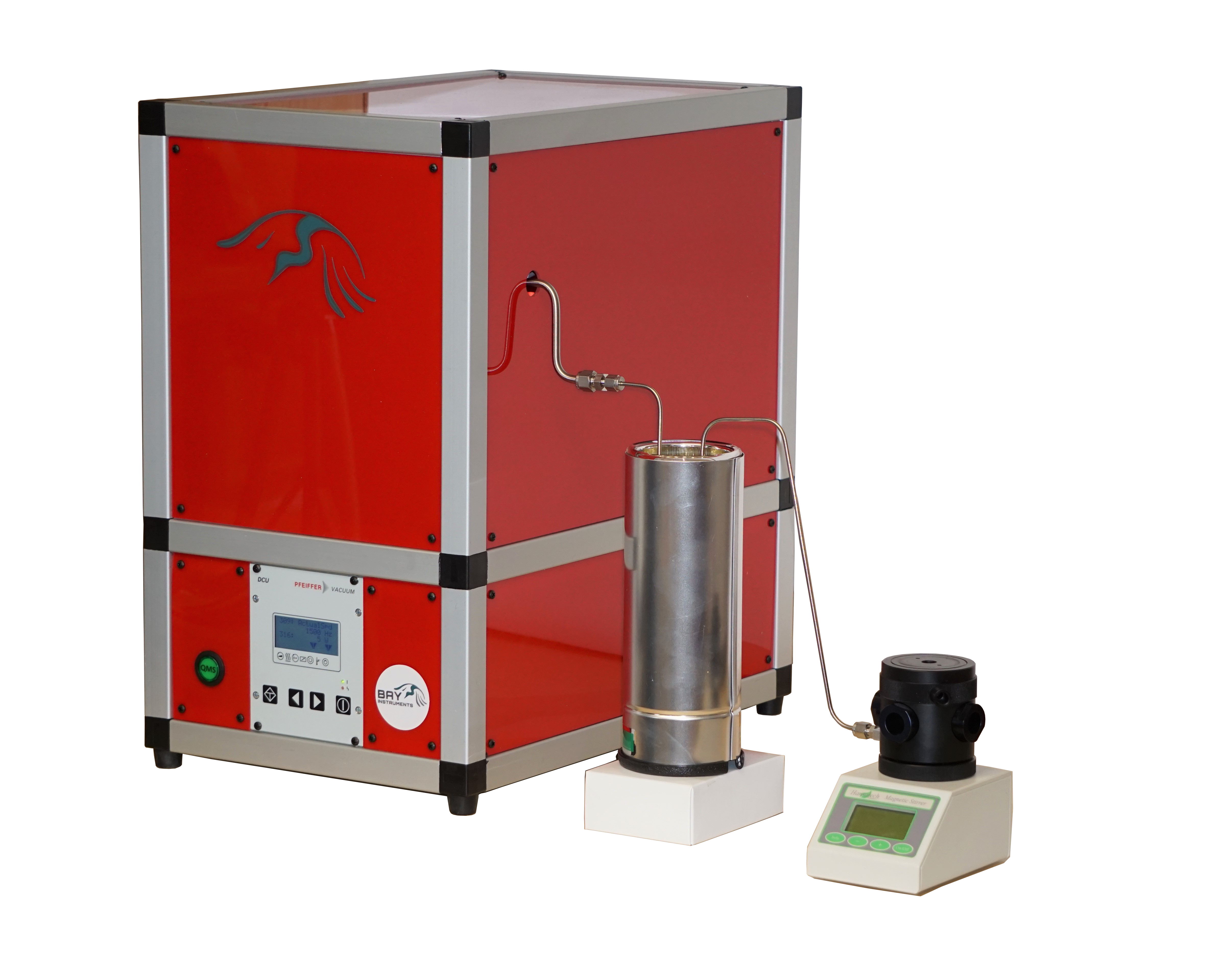膜进样质谱仪
美国自然基金委推荐测量湿地脱氮速率专用仪器
反硝化速率和脱氮速率科研的强大工具
高精度溶解气体测量仪器
前言:
氮气(N2)、氧气(O2)、二氧化碳(CO2)是湿地、河流、湖泊、海洋等水体中的重要溶解气体,是生态环境变化过程中的重要参数指标。例如,溶解氧是衡量海气扩散过程、水团混合、大洋环流以及海水中生物化学过程的重要指标;水体中CO2对于研究全球碳循环和全球气候变化具有重要作用;而水体中溶解N2则对于研究水体反硝化速率、农业氮肥利用率、水体富营养化等相关问题具有至关重要的作用。目前,测量水体海洋中溶解气体的传统方法是先采集水样,然后在实验室内或者船上进行检测,但由于很多参数会随时空的变化而发生改变,从而得不到实时原位的准确数据。水体及沉积物反硝化速率的测定方法主要有乙炔抑制法、N2通量法、质量平衡法、化学计量法和同位素法,但这些方法大多存在人为扰动大、操作繁琐、误差大的不足,因而无法精确测定淹水环境下的反硝化速率。膜进样质谱仪(MIMS)则能够实时、原位、连续监测水体中的溶解气体(N2、O2、CO2),并且能够精确测定淹水环境下水体、沉积物的反硝化速率,已被国内外众多研究机构广泛应用,并被美国自然科学基金委推荐用来测定湿地脱氮速率。同时,膜进样质谱仪还能够应用于稳定同位素(15N 、18O、13C)的检测、光合呼吸、生物反应器等方面的研究。
主要特点:
- 可实时、原位检测
- 测量精度高、重复性好
- 所需样品量少,仅5ml
- 操作简便,样品分析快,仅90s
- 不需要顶空平衡,可实现水气分离
- 可将空气中高浓度背景气体分离开,避免了样品的污染
- 专用软件(QuickData)高效评估收集的信号和数据
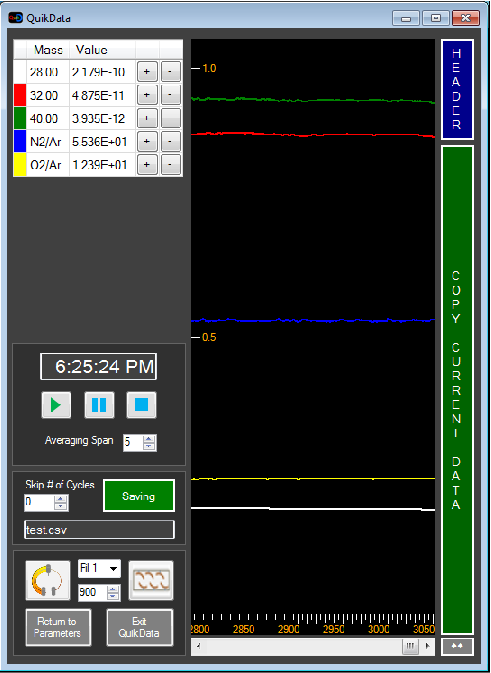
图1 QuickData软件
主要应用:
- 环境(水体、沉积物)反硝化速率的研究
- 原位测量水体(海洋\湖泊\河流\地表水\地下水)中O2、CH4、DMS、CO2和Ar浓度
- 海洋总初级生产力的测定
- 贫瘠水域的呼吸作用研究
- 稳定同位素的测定(15N 、18O、13C)
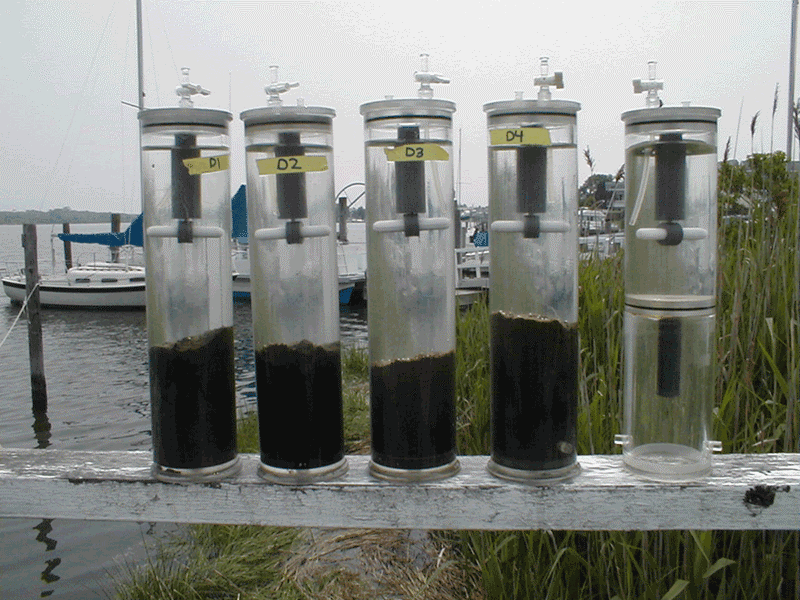
图2 MIMS在反硝化中的应用,将原状沉积物和上覆水取回在室内进行培养,研究反硝化过程中N2的排放速率
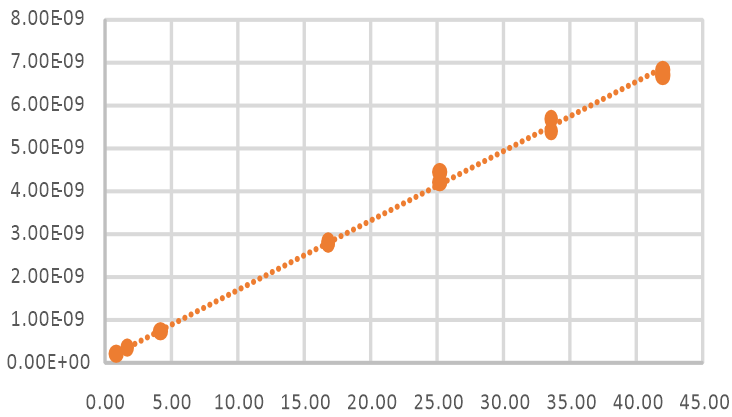

图3 利用已知CH4浓度和测量出来的信号值进行拟合曲线,进而测量未知水体中CH4浓度
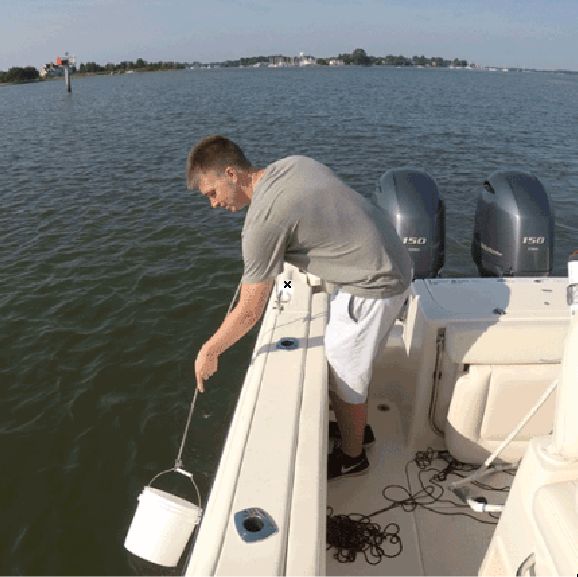
图4 MIMS可用于水生生态系统代谢和氧气动力学研究
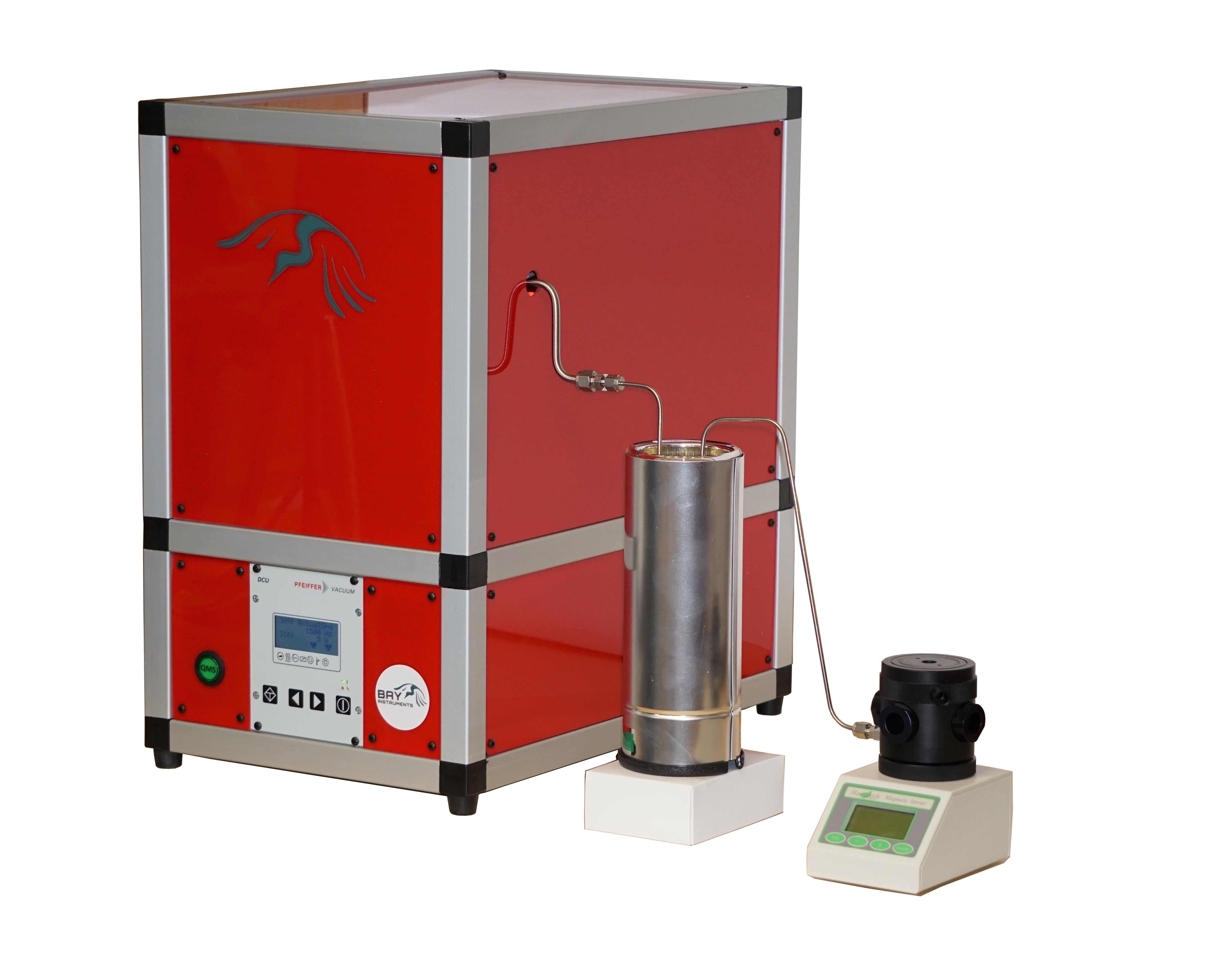
图5 MIMS可与液相氧电极或叶绿素荧光仪联用测量光合和呼吸作用
MIMS典型应用:

表1 标样连续测定10h后信号偏移情况(李晓波等,2013)
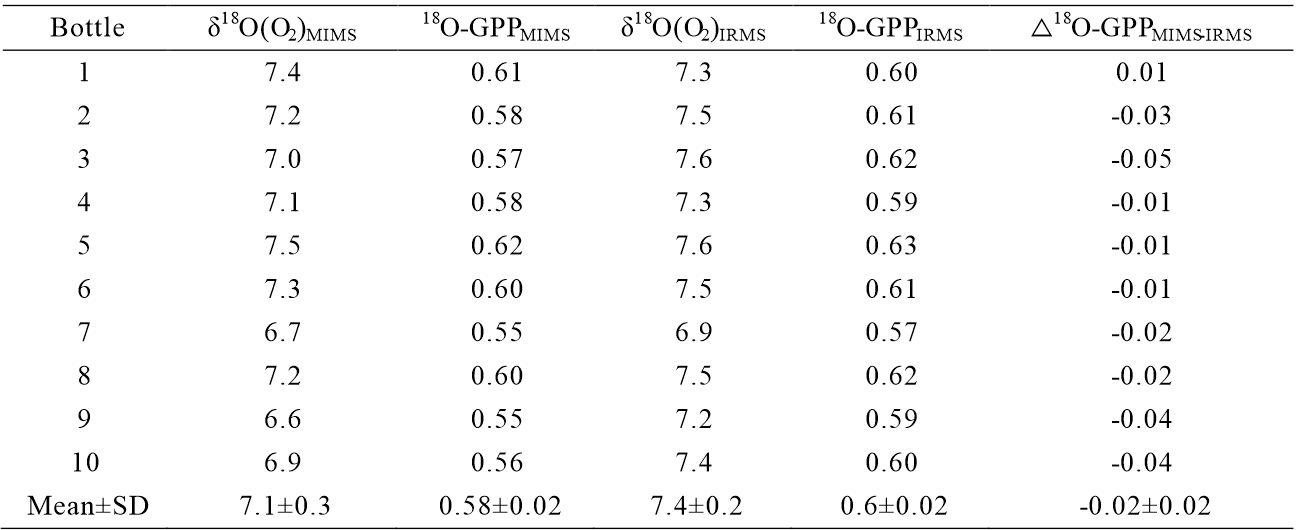
表2 MIMS与IRMS在测量海洋总初级生产力时的数据比较

图7 利用MIMS测量出11种中国典型稻田土壤下的反硝化、厌氧氨氧化、DNRA的贡献率(Shan J et. al, 2016)
参考文献:
1.李晓波, 夏永秋, 郎漫, 等. N2:Ar法直接测定淹水环境反硝化产物N2的产生速率. 农业环境科学学报, 2013, 32(6): 1284-1288
2.赵永强, 夏永秋, 李博伦, 等. 利用膜进样质谱同时测定河流沉积物反硝化和厌氧氨氧化. 农业环境科学学报, 2014, 33(4): 794-802
3.Alexandra M F R, Matthew A C. Benthic nitrogen fixation in an eutrophic estuary affected by groundwater discharge. Journal of Coastal Research, 2012, 28(2): 477-485
4. Alexander J R, Jennifer L T, Timothy J H, et al. Sediment, water column, and open-channel denitrification in rivers measured using membrane-inlet mass spectrometry. Journal of Geophysical Research: Biogeosciences, 2015, 121: 1258 -1274
5.Fred J G, Dragoslav T M, John C L. Estimating rates of denitrification enzyme activity in wetland soils with direct simultaneous quantification of nitrogen and nitrous oxide by membrane inlet mass spectrometry. Microbial & Biochemical Technology, 2013, 5(4): 095-101
6. Gueguen C, Tortell P D. High-resolution measurement of Southern Ocean CO2 and O2/Ar by membrane inlet mass spectrometry[J]. Marine Chemistry, 2008, 108(3/4): 184-194
7. Jeffrey C C, Michael K, Todd M K. Denitrification in coastal ecosystems: methods, environmental controls, and ecosystem level controls, a review. Aquatic Ecology, 1999, 33: 41-54
8. Jun S, Xu Z, Rong S, et al. Dissimilatory nitrate reduction processes in typical Chinese paddy soils: rates, relative contributions, and influencing factors. Environmental Science & Technology, 2016, 50: 9972-9980
9. Kaiser J, Reuer M K, Barnett B, et al. Marine productivity estimates from continuous O2/Ar ratio measurements bymembrane inlet mass spectromtry[J]. Geophysical Reasearch Letters, 2005, 32(19), doi: 10. 1029/2005GL023459
10. Ketil K J, Anne E G. New approach for measuring denitrification in the rhizosphere of vegetated marsh sediments. Limnology and Oceanography: Methods, 2009, 7: 626-637
11. Lesley K S, Mary A V, John K B, et al. Denitrification in nitrate-rich streams: application of N2:Ar and 15N-tracer methods in intact cores. Eeological Applications, 2006, 16(6): 2191-2207
12. Mohammad L K, Karl G R. Denitrification enzyme activity and potential of subsoils under grazed grasslands assayed by membrane inlet mass spectrometer. Soils Biology & Biochemistry, 2011, (43):1787-1797
13. Peter M G, Mark A A, Bohlke J K, et al. Methods for measuring denitrification: diverse approaches to A difficult problem. Ecological Applications, 2006, 16(6): 2091-2122
14. Reisinger A J, Tank J L, Hoellein T J, et al. Sediment, water column, and open‐channel denitrification in rivers measured using membrane‐inlet mass spectrometry[J]. Journal of Geophysical Research: Biogeosciences, 2016, 121(5): 1258-1274
15. Sara F, Daniela A V, Karin M B, et al. Application of membrane inlet mass spectrometry to measure aquatic gross primary production by the 18O in vitro method. Limnology and Oceanography: Methods, 2016, 14: 610-622
16. Shan J, Zhao X, Sheng R, et al. Dissimilatory nitrate reduction processes in typical Chinese paddy soils: rates, relative contributions, and influencing factors. Environmental Sciences & Technology, 2016, 50: 9972-9980
17. Sooomo A, Wayne S G, Todd M K. Simultaneous measurement of denitrification and nitrogen fixation using isotope pairing with membrane inlet mass spectrometry analysis. Applied and Environmental Microbiology, Mar. 2001, p. 1171-1178
18. Todd M K, Christina D, Hunt D, et al. Membrane inlet mass spectrometer for rapid high-precision determination of N2, O2, and Ar in environmental water samples. Analytical Chemistry, 1994, 66(23): 4166-4170
19. Todd K M, Cornwell J C, Zhong L. Determination of denitrification in the Chesapeake Bay from measurements of N2 accumulation in bottom water[J]. Estuaries and Coasts, 2006, 29(2): 222-231.
20. Todd M K, Matthew B S, Jeffrey C C, et al. Denitrification in estuarine sediments determined by membrane inlet mass spectrometry. Limnology and Oceanography, 1998, 43(2): 334-339
21. Tortell P D. Dissolved gas measurements in oceanic waters made by membrane inlet mass spectrometry[J]. Limnology and Oceanography: Methods, 2005, 3(1): 24-37
22. Zhou W, Xia L L, Yan X Y. Vertical distribution of denitrification end-products in paddy soils. Science of the Total Environment, 2017, 576: 462-471
23. Li X B, Xia L L, Yan X Y. Application of membrane inlet mass spectrometry to directly quantify denitrificaion in flooded rice paddy soil. Biology and Fertility of Soils, 2014, 50(6): 1-10
24. Zhao Y Q, Xia Y Q, Ti C P, et al. Nirtrogen removal capacity of the river network in a high nitrogen loading region. Environmental Science and Technology, 2015, 49(3): 1427-1435


